2022 – Hakola’s first book of nonfiction – Non Romanesque – was published in French by Les Les Fondeurs de Briques. Récits autobiographiques, diatribes, cent photos argentiques faites par l’auteur, dessins de Mosner…
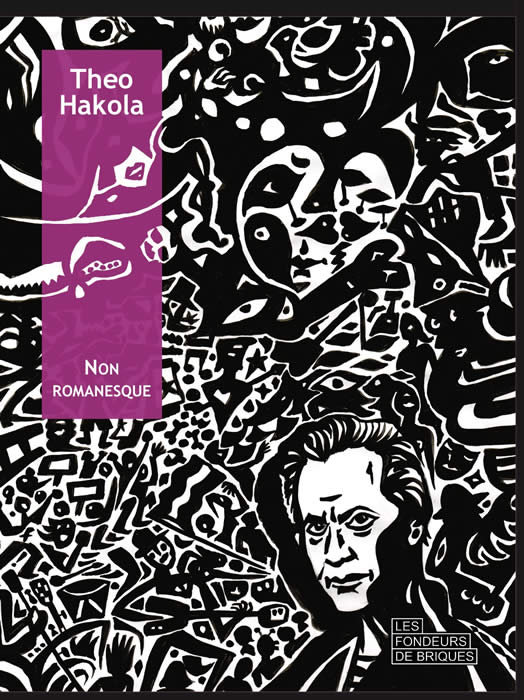
2022 – Hakola’s sixth novel – Over The Volcano – was published in French translation (Tania Capron) as Sur le volcan by Actes Sud.
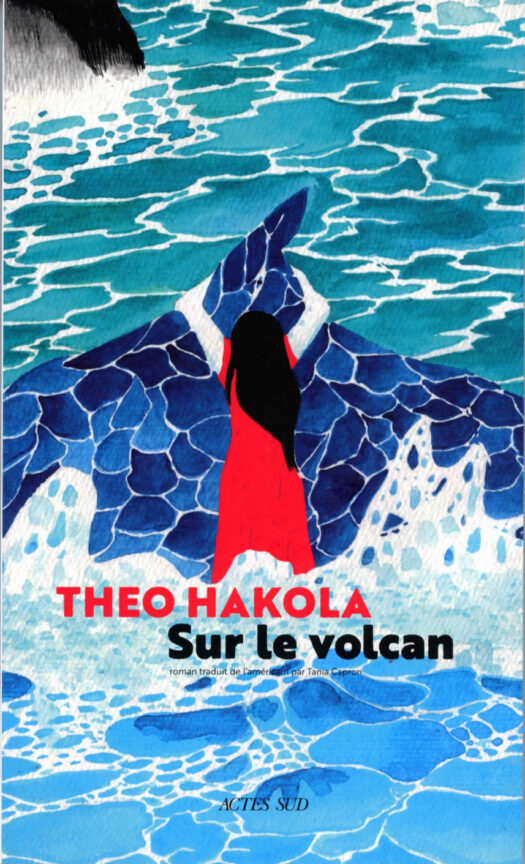
2016 – Hakola’s fifth novel – The Snake Pit – was published in French translation (Yoann Gentric) as Idaho Babylone by Actes Sud.
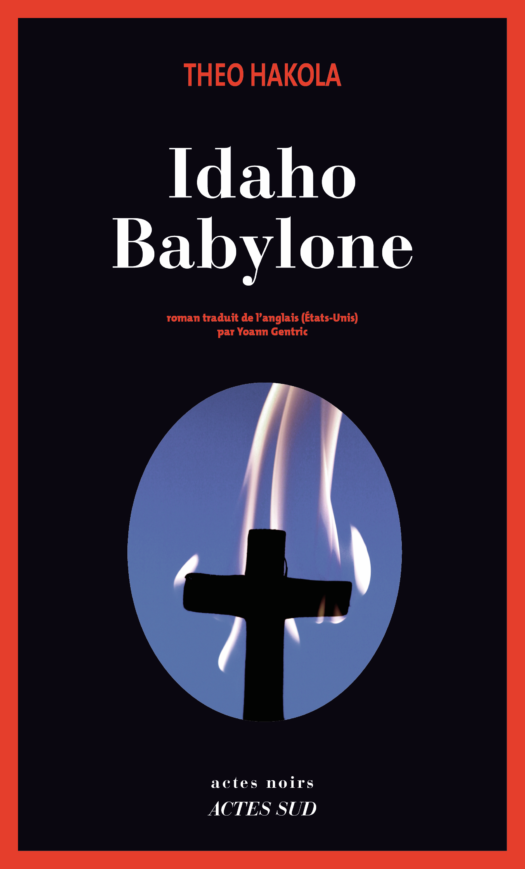

Hakola writes in English though, for the moment, his books have yet to be published in the language in which they were written. (His literary agent in the U.S. – Madison Smartt Bell at Pande Literary – is working to remedy this improbable situation…) Hakola’s first three novels – The Way of Blood, Blood Streams and The Blood of Souls, all translated by the author – form a trilogy that need not be read in the order in which they were written and published. (The first two of these were also published in Finland (translation Kalevi Nyytäjä) by WSOY.
At the bottom of this page: English translations of excerpts from French reviews of the trilogy.

2011 – Hakola’s fourth novel – Rakia – was published in French translation (Annie Brigant) by Intervalles.
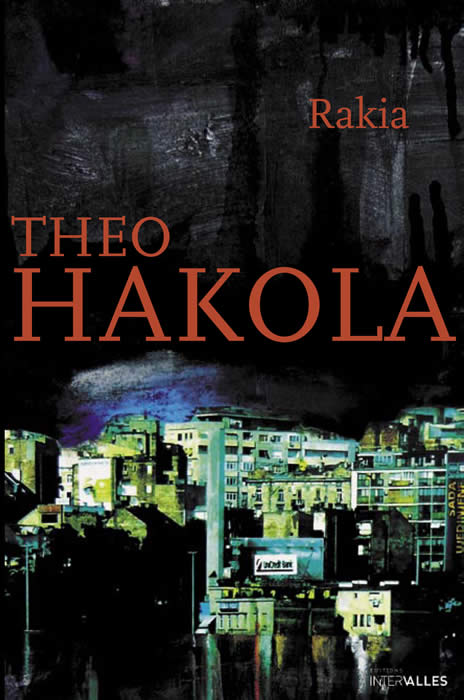
“Avec des dialogues excellemment tournés et cette verve fondamentalement politique et savoureuse, l’ex-leader de Passion Fodder emmène le lecteur au plus proche de l’ivresse… Ou comment passer du statut d’icône rock de notre adolescence à celui d’écrivain infiniment précieux.” Etienne Greib – Magic
“Les notes sont justes et la partition addictive presque monocorde comparée aux dialogues brutaux, intempestifs qu’elle met délicieusement en valeur.” Sylvie Granotier.
” … il suffit de nous laisser porter par la mélodie de cet auteur. Car Rakia est avant tout une voix singulière: des verbes sans sujet, des phrases qui s’enchaînent et imposent leurs images, une sensualité certaine. Ce qu’il reste peut-être au final quand on a l’esprit embrumé par l’alcool, quand les fantômes se mêlent à la réalité: la soif de vivre.” Claire Lamotte – Nabbu.com
“Un Jules et Jim à l’envers à la sauce balkanique.” Novo.
Hakola writes in English though, for the moment, none of his books have been published in the language in which they are written. (His literary agent in the U.S. is presently working hard to remedy this improbable situation…) His first three novels – The Way of Blood, Blood Streams and The Blood of Souls, all translated by the author – form a trilogy that need not be read in the order in which they were written and published. (The first two of these were also published in Finland (translation Kalevi Nyytäjä) by WSOY.
At the bottom of this page: English translations of the following excerpts from French reviews of the trilogy.
2008 – Le Sang des âmes – was published in French translation by Intervalles.
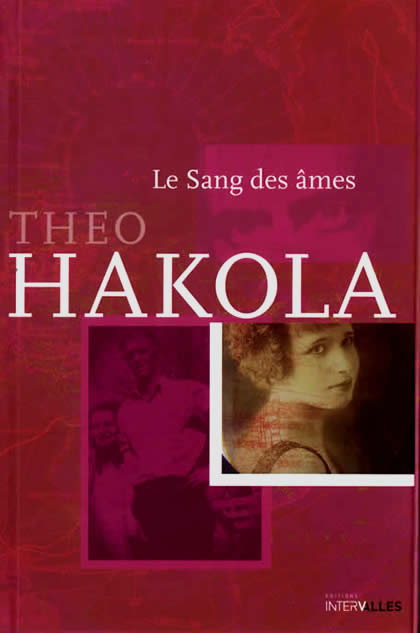
“Avec une densité dans le récit qui puise sa force dans une pudeur rare (sur les traces de Carson McCullers, évidente influence avouée depuis longtemps) et dont la place nous manque ici pour en décrire la force et l’émotion, Theo Hakola signe un livre essentiel à tout épris de littérature, américaine ou autre.” Étienne Greib – Magic – 23-5-2008
“En concluant avec Le Sang des âmes une trilogie historique dont les premiers volets (La Route du sang, 2001, et La Valse des affluents, 2003) s’articulaient autour de relectures du mythe de Zorro at de La Chartreuse de Parme, Theo Hakola confirme son goût pour les fresques brassant passion et politique… et revisite avec viruosité un siècle troublé.” Bruno Juffin – Les Inrockuptibles 17-6-2008
2003 – La Valse des affluents – Le Serpent à plumes
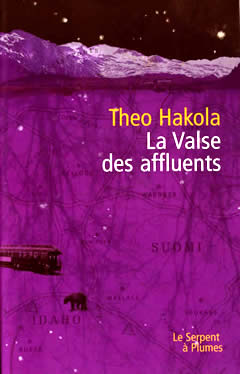
“Un puissant souffle épique emporte le lecteur à la suite de Carson Clay dont “la ballade” revêt des allures de gigue tant sa naïveté lui réserve de chausse-trapes. Captivante et romanesque à souhait, cette chronique d’une lutte syndicale aux accents stendhaliens produit des échos dans le présent, puisqu’elle met en scène les ancêtres de Peter et de Jewell. Jewell Stone, joyau de femme à la dent dure et à “la voix de fumée et de miel”, oscille entre tenir et lâcher le bride de son désir. Et si cette chanteuse ne cherche pas trop à définir dans quelle eau elle nage, Hakola s’en soucie, qui remonte les affluents de sa destinée pour y rencontrer les êtres dont elle a reçu le talent et le toupet ravageur en héritage.
Pari réussi pour l’écrivain orpailleur qui entrelace avec bonheur les intrigues sentimentales, politiques, artistiques et filiales que le rythme endiablé et très travaillé de la phrase rend palpitantes, dans un roman-fleuve où passent quelques scintillants électrons libres.”
Élisabeth Vust – 24 Heures, 4-4-2003
2001 – La Route du sang – Le Serpent à plumes
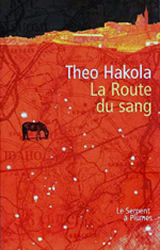
“Loin des premières œuvrettes sagement linéaires et inlassablement introspectives, La Route du sang jette un vertigineux viaduc entre les frasques formelles des grands écrivains des années 20 et la pétulance punk des années CBGB’s.” Bruno Juffin – Les Inrockuptibles 22-5-2001
“Hakola tisse ainsi un écheveau de destins individuels qui se croisent sur la toile de fond de l’histoire – entendons la grande Histoire, celle qui se construit à coups de fusils et de luttes syndicales – et son récit, taillé dans le flanc d’un discrète poésie, engendre des personnages d’une densité saisissante… Essayez simplement de refermer La Route du sang et vous verrez que vous ne parviendrez jamais tout à fait : il en va de ce livre comme d’une plaie béante ouverte par la main d’un maître.” Élise Chassaigne – Lyon Capitale 23-5-2001

Hyväosaisten valssi – WSOY, 2005
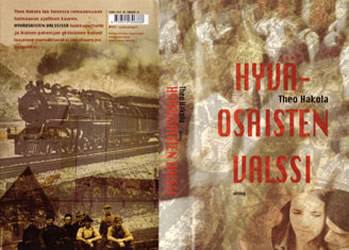
Tarinat alkavat punoutua toisiinsa kuin huomaamatta. Kahta eri aikaa ja maailmaa löyhästi yhdistävä side osoittautuu ihmeen pitäväksi.
Kirjailijalla on historiaan halukas vainu sekä luovan kirjoittamisen armolahja. Hakola ei hae sensaatioita — villi, värikäs ja asiapitoinen tarina etenee kuin itsestään. Paksuudestaan huolimatta suuri romaani.
Ilta-Sanomat, Matti Saurama
Trilogian päätöstä jää odottamaan kiinnostuneena, jopa pienen myötähermostumisen merkeissä. Onhan Hakola jo nyt venyttänyt suoran kerronnan aikaa peräti vuoteen 2029. Mistä seuraavat eväät?
Tulevaisuuskuva sinänsä on murhaavan satiirinen, samalla surullinen. Turismiteollisuuden yksityiset yhtiöt ovat täydellisesti tärvänneet Peterin sisimpien muistojen paikat. “Virrankaltainen kaipuu” rauhan lähteille näyttää 2029 yhä toivottomammalta, niin kuin se monien mielestä näyttää jo nyt.
Uutispäivä Demari, Juhani Ruotsalo
Veren reitti – WSOY, 2002
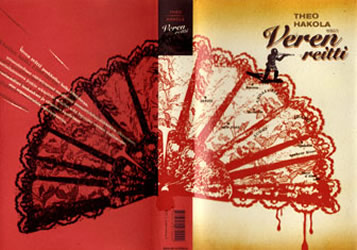
Itsekin suomalaista sukujuurta oleva Hakola puhkoo marttyyrikuoleman, maskuliinisen ahdistuksen ja boheemin taiteilijaelämän myyttejä. Mutta ei romaanin naisistakaan ole täyttämään perinteisiä äidin tai uhrautuvan rakastajan rooleja.
‘Veren reitti’ rönsyilee minkä ehtii ja on paikoin hajota ainestensa runsauteen. Tarinankerronnan vimma ja rosoisuus on paradoksaalisesti myös Hakolan keskeinen vahvuus… Hakola onnistuu yhdistämään älyllisen etäännyttämisen ja inhimillisen koskettavuuden.
Parnasso, Jani Saxell
‘Veren reitti’ osaa siis myös viihdyttää ja hymyilyttää vakavosta aiheistaan huolimatta… Hakolan kieli on soinnukasta ja rytmikästä.Helsingan Sanomat, Maris Säntti

Theo Hakola’s “Blood Trilogy” in the French Press:
The Way of Blood (La Route du sang 2001)
The Blood Waltz (La Valse des affluents 2003)
The Blood of Souls (Le Sang des âmes 2008)
“A long ways from those safely linear and endlessly introspective little first works, La Route du sang throws up a breathtaking viaduct between the formal escapades of the great writers of the 1920s and the punk petulance of the CBGB years.”
– Bruno Juffin (Les Inrockuptibles 22-5-2001)
“Hakola thus weaves together a web of individual destinies crossing each other over a background of history – meaning History with a capital H here, History built on gun shots and union battles – and his narrative, carved into the flank of some subtle poetry, begets characters of startling density… Just try closing La Route du sang and you’ll see you never fully manage to: what goes for a gaping wound opened by the hand of a master also goes for this book.”
– Élise Chassaigne (Lyon Capitale 23-5-2001)
“A hundred and thirty-six years of American history running into the future and shot full of human passion, the whole stuffed into a hefty tome thrown into the face of those worthy of it… Very good.”
– Antonin Iommi-Amunatagui (Libération 10-7-03)
“A powerful epic inspiration carries the reader alongside Carson Clay whose ‘ballad’ looks more like a jig as his naivety draws him into various traps. As storybook captivating as you could hope for, this account of a Stendhalian accented labor union battle also finds echoes in the present detailing the lives of Peter and Jewell’s ancestors. Jewell Stone, a gem of a woman with a stinging tongue and “a voice of smoke and honey,” fluctuates between reining in and letting loose her desire. And if the singer she is makes little effort to articulate the waters in which she’s swimming, Hakola does, working his way up the rivers of her destiny in order to meet with those from whom she’s inherited her talent and her scathing cheek…
“The author, mining for gold, has pulled it off, happily knitting together romantic, political, artistic and family plot lines while the diabolical rhythm of his carefully worked sentences thrill in a roman-fleuve featuring several scintillating loose canons.”
– Élisabeth Vust (24 Heures 4-4-2003)
“With a density in the narrative drawing its strength from a rare sensitivity (following in the footsteps of Carson McCullers, an obvious and acknowledged influence for quite some time) and whose power and emotion we lack the space here to describe, Theo Hakola has authored a book essential for anyone enamored of literature, be it American or other.”
– Étienne Greib – Magic – 23-5-2008
“By concluding with Le Sang des âmes a historical trilogy whose first volumes (La Route du sang, 2001, and La Valse des affluents, 2003) were structured around a rereading of the Zorro myth and The Charterhouse of Parma, Theo Hakola confirms his taste for panoramas mixing passions and politics… and revisits with virtuosity a troubled century.”
– Bruno Juffin – Les Inrockuptibles 17-6-2008